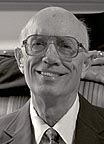March 07, 2005
Campus mourns passing of Donald Boydston
CARBONDALE, Ill. -- Donald N. Boydston, who guided Southern Illinois University Carbondale's nationally recognized health education department for 33 years, died Sunday, March 6, 2005 in Naples, Fla. He was 84.Recruited to Carbondale by then-University President Delyte W. Morris in 1955, Boydston shaped the University's Department of Health Education and Recreation by attracting not just pre-eminent faculty to campus, but also finding and mentoring younger faculty members who have gone on to distinguished careers in the health education field. Boydston also guided the department's esteemed graduate program.
While at SIUC, Boydston also helped transform the athletics department from the small-college ranks into a big-time university program in 15 years as athletics director from 1957 to 1972.
Boydston and his wife, Jo Ann – an internationally respected Dewey scholar who led the University's Center for Dewey Studies to international prominence – provided a $1 million gift in 1994 to establish the Jo Ann and Don Boydston Endowed Chair of American Philosophy in the College of Liberal Arts.
Boydston's last faculty hire during his tenure as chair of the health education department was then-assistant professor Paul D. Sarvela, in 1986. Sarvela is now dean of the College of Applied Sciences and Arts.
Boydston leaves two distinct legacies at SIUC, Sarvela said.
"He made an outstanding impact in the field of health education and the College of Education, and he was very important in the development of our athletic programs," Sarvela said. "Few people have made such an impact on two large programs at SIUC.
"We have lost a wonderful friend to SIUC with his passing, but the contributions he has made allow us to be what we are and what we can be," Sarvela said.
Boydston also hired health education professor Dale O. Ritzel, who also directs the Safety Center, in 1966. Ritzel later succeeded him as department chair.
Boydston was adept at hiring quality faculty, providing the support for them to succeed and then staying out of their way "and letting them do the good job they were able to do," Ritzel said.
"I think you can be very successful by not micromanaging," Ritzel said.
Boydston did, however, provide support and nurturing when needed.
"Whenever you had a question he had a true open-door policy, and was there to help you work through the problem," Sarvela said. "He was a wonderful mentor; I was truly blessed to have him as my first department chair. He enabled and mentored you in a way that it would really boost the self-confidence of a young faculty member."
Boydston recognized and built upon the strengths of faculty members within the department, Sarvela said.
Professor Mark J. Kittleson, who came to SIUC in 1989, said Boydston's legacy remains intact nearly 20 years after his retirement. People would still refer to him as "Dr. Boydston," Kittleson said.
"It shows the incredible amount of respect that people had for him," Kittleson said.
Boydston was a strong believer in a comprehensive athletics program where supporting minor sports programs was as important as support for football and basketball, Ritzel said.
That emphasis showed in the development of one of the nation's most well rounded athletic programs in the 1960's – moving from National Association of Intercollegiate Athletics status to a force in the NCAA.
Between 1960 and 1972, SIUC teams won 12 national championships in gymnastics, cross-country, swimming, golf and tennis. Boydston was on the planning committee starting in 1956 for the SIU Arena, which was completed in 1964.
Boydston's desire to attract the youngest and brightest scholars for the health education program carried over into athletics. He called experts in a particular sport and simply asked who they thought were three of the best young coaches in the country who would likely succeed in the next 10 years. The resulting answers brought basketball coaches Jack Hartman and Paul Lambert, gymnastics coach Bill Meade, track coach Lew Hartzog, and baseball coach Itchy Jones to Carbondale.
Boydston also recruited the best and brightest minority student-athletes to campus, including former Saluki football standouts Carver Shannon, Sam Silas, Houston Antwine, and Lionel Antoine along Walt Frazier, who helped lead Hartman's men's basketball team to the 1967 National Invitational Tournament title.
Seymour Bryson, SIUC's associate chancellor for diversity, came to SIUC in 1955 and was a student worker for Boydston for four years while in college. Boydston was "primarily responsible for integrating SIUC's intercollegiate athletic programs, "Bryson said.
"During a period of time when it was not fashionable to recruit students of color, I think Dr. Boydston set the climate for Southern to become a pioneer in integrating the intercollegiate athletic program, and he was primarily responsible for recruiting most of the athletes during that time from the deep South," Bryson said.
Bryson said Boydston was also responsible for many outstanding African-Americans receiving their graduate degrees in health education, including James M. Rosser, president of California State University-Los Angeles.
A native of Fort Worth, Texas, Boydston grew up in Oklahoma and received his bachelor's and master's degrees from Oklahoma State University, and a master's and doctoral degree from Columbia University. He was a decorated veteran of the U.S. Marine Corps who saw action at Saipan and Iwo Jima during World War II.
Boydston's first teaching position was as a professor in health education at the University of Mississippi, where he stayed for six years before coming to SIUC.
His wife, Jo Ann Boydston, survives.
At Boydston's request, there will be no funeral service. Contributions to honor Donald N. Boydston may be made to the Boydston Scholar-Athlete Scholarship, Planned Parenthood of Collier, County, Inc., or Hospice of Naples, Fla.
